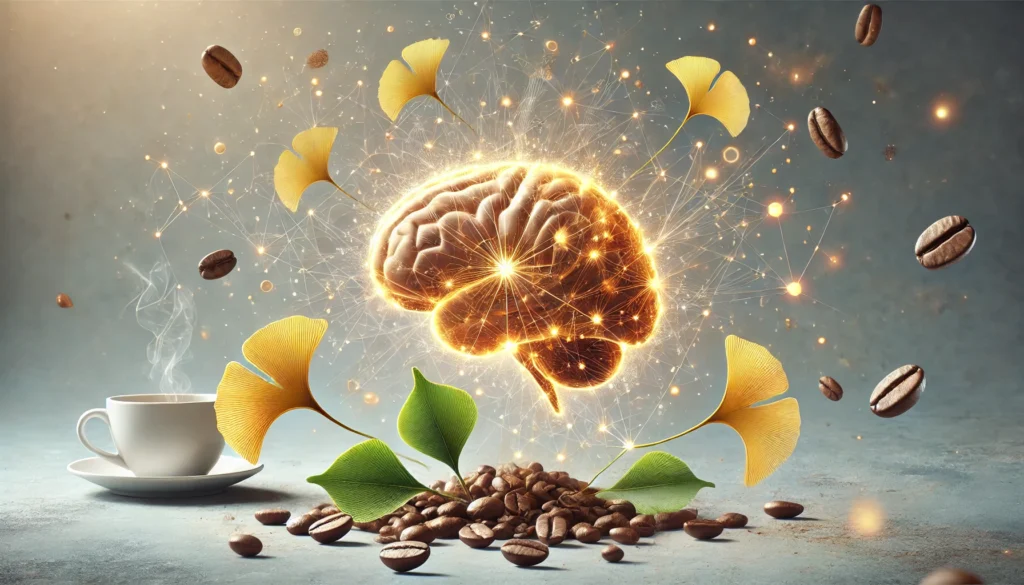In today’s fast-paced world of information overload and perpetual multitasking, the pursuit of enhanced mental performance has become a modern imperative. For professionals, students, artists, and innovators alike, the desire to improve focus, mental clarity, and creativity has sparked growing interest in cognitive enhancers known as nootropics. Among these, two of the most studied and widely consumed substances are caffeine and Ginkgo biloba. While each has distinct effects on the brain when taken individually, their synergistic interaction presents a fascinating avenue for sharpening mental acuity and stimulating creative cognition.
You may also like: Ginkgo Biloba Benefits for Creative Thinking: How This Ancient Herb Supports Cognitive Clarity and Focus
Caffeine is a central nervous system stimulant known for its ability to ward off fatigue, improve alertness, and enhance performance in both mental and physical tasks. It is the most widely consumed psychoactive substance in the world and is found in coffee, tea, chocolate, and various energy supplements. On the other hand, Ginkgo biloba, derived from one of the oldest tree species on Earth, has been used in traditional Chinese medicine for centuries. Its neuroprotective and circulation-boosting properties make it a popular herbal supplement for memory enhancement and mental clarity.
When caffeine and Ginkgo biloba are used in combination, their distinct mechanisms of action appear to complement one another in powerful ways. Caffeine, with its quick-onset stimulation, can heighten mental alertness and motivation, while Ginkgo biloba’s slower-acting influence enhances blood flow to the brain and may support memory formation and sustained focus. Together, these compounds may offer a balanced cognitive boost that benefits both linear, task-oriented thinking and the free-flowing mental states associated with creativity. As we delve into the science, history, and potential applications of these two nootropics, we uncover a compelling narrative about how natural compounds can be strategically combined to unlock higher states of human thought and performance.

The Neuroscience of Focus and Creativity
To understand how caffeine and Ginkgo biloba work in tandem, it is essential to first explore the neurobiological underpinnings of focus and creativity. While these cognitive functions are often treated as distinct faculties, they are deeply interwoven within the architecture of the human brain. Focus—or sustained attention—relies on the efficient regulation of executive functions within the prefrontal cortex. This brain region orchestrates goal-directed behavior, decision-making, and the suppression of distractions. Neurotransmitters such as dopamine and norepinephrine play crucial roles in modulating attention and executive functioning.
Creativity, by contrast, involves more distributed and dynamic neural activity. The default mode network (DMN), which becomes active during rest, daydreaming, and divergent thinking, is often associated with the generation of novel ideas and mental simulations. Creativity also depends on the brain’s ability to flexibly transition between different modes of thought, a process facilitated by interactions between the DMN, the executive control network, and the salience network. Neurochemicals such as dopamine and acetylcholine influence these interactions and can modulate the creative state.
Optimal creative thinking requires a delicate balance between focused attention and spontaneous ideation. Too much focus may inhibit creativity by narrowing cognitive scope, while too little focus can lead to distraction and inefficiency. This balance is often referred to as cognitive flexibility—the capacity to shift between convergent and divergent thinking. Any substance or intervention that aims to enhance cognition must therefore support this dynamic equilibrium. This is precisely where the combination of caffeine and Ginkgo biloba shows promise. By targeting different aspects of neural function, they can work in tandem to promote both focus and creativity without tipping the balance too far in either direction.
Caffeine: Mechanisms, Benefits, and Cognitive Applications
Caffeine exerts its primary effects through antagonism of adenosine receptors, particularly A1 and A2A subtypes. Adenosine is an inhibitory neuromodulator that accumulates in the brain during waking hours and contributes to the feeling of drowsiness. By blocking adenosine receptors, caffeine reduces inhibitory signaling, leading to increased activity of excitatory neurotransmitters such as dopamine, norepinephrine, and glutamate. This results in heightened arousal, improved reaction time, and a general sense of increased energy and alertness.
The cognitive benefits of caffeine have been well-documented in scientific literature. Moderate doses of caffeine have been shown to improve attention, vigilance, working memory, and psychomotor performance. These effects are particularly pronounced in situations of sleep deprivation or prolonged mental effort, where caffeine can help maintain performance and reduce subjective fatigue. Moreover, caffeine enhances dopaminergic activity in the prefrontal cortex, which supports goal-oriented behavior and sustained focus.
However, caffeine’s stimulant properties can also lead to drawbacks if consumed in excess. High doses may cause jitteriness, anxiety, increased heart rate, and sleep disturbances. The rapid onset of stimulation can also lead to a subsequent crash in energy levels, particularly if caffeine is used as a primary source of motivation. This is where the balancing effect of Ginkgo biloba becomes especially relevant. By tempering the sharp peaks of stimulation with a more gradual and sustained enhancement of cognitive function, the caffeine and Ginkgo biloba combination may help users achieve a more stable and productive mental state.
Ginkgo Biloba: Mechanisms, Benefits, and Cognitive Applications
Ginkgo biloba contains a complex array of bioactive compounds, including flavonoids and terpenoids, which have antioxidant, anti-inflammatory, and vasodilatory effects. These compounds are believed to enhance cerebral blood flow by promoting vasodilation and reducing blood viscosity, thereby improving the delivery of oxygen and nutrients to brain tissues. Enhanced blood flow is particularly beneficial for regions such as the hippocampus and prefrontal cortex, which are involved in memory consolidation, attention, and executive function.
Unlike caffeine’s rapid stimulation, the effects of Ginkgo biloba tend to manifest more gradually and may accumulate over time with consistent use. Clinical studies have demonstrated that Ginkgo supplementation can improve cognitive performance in older adults and individuals with cognitive impairment, likely due to its neuroprotective and circulation-enhancing properties. In healthy young adults, the evidence is more mixed but still suggests potential benefits for working memory, processing speed, and attention span, especially under conditions of mental fatigue or stress.
In terms of its influence on creativity, Ginkgo biloba’s impact is more subtle yet potentially profound. By supporting neural plasticity and reducing oxidative stress, it may help maintain the health of neuronal circuits involved in associative thinking and imaginative processes. Furthermore, by improving the functional connectivity between brain regions through enhanced blood flow, Ginkgo may facilitate the fluid integration of diverse cognitive inputs—a hallmark of creative insight. This makes Ginkgo biloba an ideal counterpart to caffeine, enhancing cognitive resilience and supporting the brain’s capacity for complex, integrative thought.

Frequently Asked Questions: Caffeine and Ginkgo Biloba for Focus and Creativity
1. Can caffeine and Ginkgo biloba be taken together daily, or should they be cycled?
While both caffeine and Ginkgo biloba are generally safe for daily use when taken in moderation, many cognitive health experts recommend cycling them occasionally to maintain their effectiveness. The body can build a tolerance to caffeine over time, reducing its stimulatory effects, whereas Ginkgo biloba may offer more stable, long-term benefits. Cycling might involve taking a break from caffeine for a few days every few weeks while continuing Ginkgo. Interestingly, users who alternate their intake notice that caffeine and Ginkgo biloba together work more effectively when the brain has not adapted to a constant supply. By giving your neuroreceptors a brief rest, especially from caffeine, you may experience renewed sensitivity to its benefits, particularly when paired with Ginkgo’s consistent circulatory support.
2. Are there any timing strategies to maximize the effects of Ginkgo and caffeine?
Yes, timing can significantly influence the cognitive benefits you receive from this combination. Caffeine works quickly—often within 30 to 45 minutes—so it’s typically best consumed in the morning or early afternoon. Ginkgo biloba, by contrast, may take several weeks of consistent use to show full benefits, but acute doses still contribute to blood flow enhancements within a few hours. For optimal synergy, many users take caffeine in the morning and Ginkgo biloba either with it or slightly earlier, allowing circulation to improve before the caffeine peaks. This timing strategy allows Ginkgo and caffeine to align their effects, leading to smoother mental clarity and prolonged periods of focus.
3. How does the combination of caffeine and Ginkgo biloba affect long-term brain health?
Emerging research suggests that caffeine and Ginkgo biloba may have complementary roles in promoting brain longevity. While caffeine has antioxidant properties and may reduce the risk of neurodegenerative diseases like Parkinson’s, Ginkgo is known for supporting microvascular integrity and neuroplasticity. Their combined action may help reduce oxidative stress while simultaneously maintaining cerebral blood flow. Over time, this dual action may contribute to healthier aging of brain structures involved in memory and executive function. Individuals seeking to maintain cognitive health into later life might consider the sustained use of both—provided it is done with appropriate dosage and medical guidance.
4. Can Ginkgo and caffeine help overcome creative blocks in writers or artists?
Many creatives have reported using this combination to break through mental barriers that stifle originality. Caffeine alone may sometimes overstimulate and lead to rigid or repetitive thinking, but adding Ginkgo biloba appears to buffer this by improving blood flow to areas involved in free association and abstract thought. The result is a more fluid mental state where the user feels energized yet open-minded. Unlike high doses of caffeine, which can produce tunnel vision, caffeine and Ginkgo biloba together can promote both focus and cognitive openness. Writers, designers, and musicians often report an improved ability to connect disparate ideas, making this blend a valuable tool for unlocking creativity.
5. Are there gender-specific responses to caffeine and Ginkgo biloba?
Though not widely discussed, some studies suggest there may be gender-based differences in the metabolism and effects of these substances. Women, for instance, may metabolize caffeine more slowly depending on hormonal cycles and use of oral contraceptives, potentially prolonging its effects. Ginkgo biloba’s impact on cerebral blood flow might also interact differently with hormonal fluctuations, possibly amplifying cognitive benefits during certain phases of the menstrual cycle. This makes the caffeine and Ginkgo biloba combination potentially more variable in women than men. Personalized experimentation—under supervision if necessary—can help individuals determine the ideal timing and dosage.
6. Does combining Ginkgo and caffeine improve social cognition or emotional intelligence?
While the effects are not as direct as with focus or memory, users have reported enhanced clarity and responsiveness in social interactions when taking both supplements. Caffeine increases alertness and verbal fluency, while Ginkgo biloba appears to help with emotional regulation and contextual processing by enhancing blood flow to key emotional centers like the limbic system. Together, Ginkgo and caffeine may support improved mental flexibility, aiding in reading subtle social cues or adapting one’s communication style. In high-pressure environments like public speaking or negotiation, the blend may help maintain poise and cognitive agility. It’s not a substitute for emotional intelligence training, but it can enhance one’s baseline responsiveness.
7. How does this combination compare to other nootropic stacks?
In contrast to complex nootropic blends that may include racetams, synthetic compounds, or adaptogens, caffeine and Ginkgo biloba offer a more natural, accessible alternative with a well-researched safety profile. Many nootropic users appreciate the simplicity of this combination and the lack of dependency risks that some synthetics carry. Moreover, the synergy between Ginkgo and caffeine tends to be more sustainable, particularly for long-term users who prioritize both cognitive sharpness and vascular health. While other stacks may provide more intense stimulation, they often come with greater potential side effects. Caffeine and Ginkgo biloba, by comparison, strike a balance between efficacy and holistic wellness.
8. What are the potential downsides of using caffeine and Ginkgo biloba together?
Though generally safe for most people, combining Ginkgo and caffeine may still pose risks if not managed responsibly. Individuals sensitive to stimulants may experience jitteriness or insomnia, especially if caffeine intake is high or consumed late in the day. Ginkgo can mildly thin the blood, which might interact with medications like anticoagulants. In rare cases, combining caffeine and Ginkgo biloba could increase the risk of headaches or digestive upset due to overstimulation of the nervous system. To minimize these risks, it’s important to start with low doses, assess tolerance, and consult a healthcare provider if you have preexisting health conditions or take prescription medications.
9. Are there differences in effectiveness between synthetic and natural sources of these compounds?
Indeed, the source and quality of both caffeine and Ginkgo biloba can influence their effects significantly. Natural caffeine from green tea or yerba mate may include L-theanine, which tempers the stimulation with calming effects, creating a more balanced cognitive state. Likewise, high-quality Ginkgo extracts standardized for flavonoid and terpene content are more likely to yield consistent results. Users who combine naturally derived caffeine and Ginkgo biloba often report a smoother, more focused energy compared to synthetic forms. Sourcing from reputable suppliers ensures potency, safety, and optimal synergy between the two.
10. Could caffeine and Ginkgo biloba support cognitive recovery after burnout or brain fog?
Yes, the thoughtful use of caffeine and Ginkgo biloba may aid in the recovery from periods of cognitive burnout or persistent brain fog, particularly when used as part of a broader wellness regimen. Caffeine provides the immediate alertness and drive to re-engage with tasks, while Ginkgo’s circulatory support helps restore clarity and mental stamina over time. This combination may be particularly useful during post-illness recovery or transitional phases marked by cognitive fatigue. However, caffeine and Ginkgo biloba are not substitutes for rest, hydration, or nutrition—they work best as part of a comprehensive brain recovery strategy. Over-reliance should be avoided, but when used strategically, they can provide the needed boost to rebuild cognitive momentum.

Synergistic Effects of Ginkgo and Caffeine on Mental Performance
When used together, caffeine and Ginkgo biloba exhibit a complementary interaction that enhances cognitive performance more effectively than either substance alone. This synergistic effect arises from their distinct but interrelated mechanisms of action. Caffeine delivers rapid stimulation by blocking adenosine and enhancing dopaminergic activity, which boosts alertness and motivation. Ginkgo, meanwhile, improves cerebral circulation and supports neuroplasticity, creating an environment in which stimulated neural activity can be sustained and optimized.
Research has begun to explore the cognitive impact of combining Ginkgo and caffeine in various formulations. Some studies have found that this combination improves attention, memory recall, and task switching more effectively than caffeine or Ginkgo alone. These findings support the hypothesis that caffeine and Ginkgo biloba, when used together, may create a more balanced and enduring cognitive enhancement profile. For example, the immediate alertness induced by caffeine may be sustained longer and experienced more smoothly with the vasodilatory support of Ginkgo.
Additionally, this combination may enhance the experience of creative flow—a state characterized by intense focus, a sense of effortless involvement, and heightened creative output. The stimulation provided by caffeine helps initiate flow by boosting motivation and energy, while Ginkgo’s cerebral support helps maintain this state by improving the coherence and efficiency of neural communication. Together, they may help users sustain a high level of performance without the crashes or cognitive fatigue sometimes associated with caffeine use alone.
Further Reading:
14 Benefits of Caffeine: Focus, Cognition, & Neuroprotection
Percolating ideas: The effects of caffeine on creative thinking and problem solving
Ginkgo Biloba: A Cognitive Enhancer?
nootropics for creativity, brain supplements for focus, natural cognitive enhancers, herbal remedies for mental clarity, memory support herbs, boosting concentration naturally, cognitive flexibility techniques, brain health optimization, mental performance boosters, neuroenhancement strategies, improving attention span, adaptogenic herbs for the brain, enhancing executive function, smart supplements for thinking, neural efficiency support, flow state supplements, energy and focus stack, mental fatigue recovery, optimizing creative thinking, neurovascular health support
.Important Note: The information contained in this article is for general informational purposes only, and should not be construed as health or medical advice, nor is it intended to diagnose, prevent, treat, or cure any disease or health condition. Before embarking on any diet, fitness regimen, or program of nutritional supplementation, it is advisable to consult your healthcare professional in order to determine its safety and probable efficacy in terms of your individual state of health.
Regarding Nutritional Supplements Or Other Non-Prescription Health Products: If any nutritional supplements or other non-prescription health products are mentioned in the foregoing article, any claims or statements made about them have not been evaluated by the U.S. Food and Drug Administration, and such nutritional supplements or other health products are not intended to diagnose, treat, cure, or prevent any disease.


